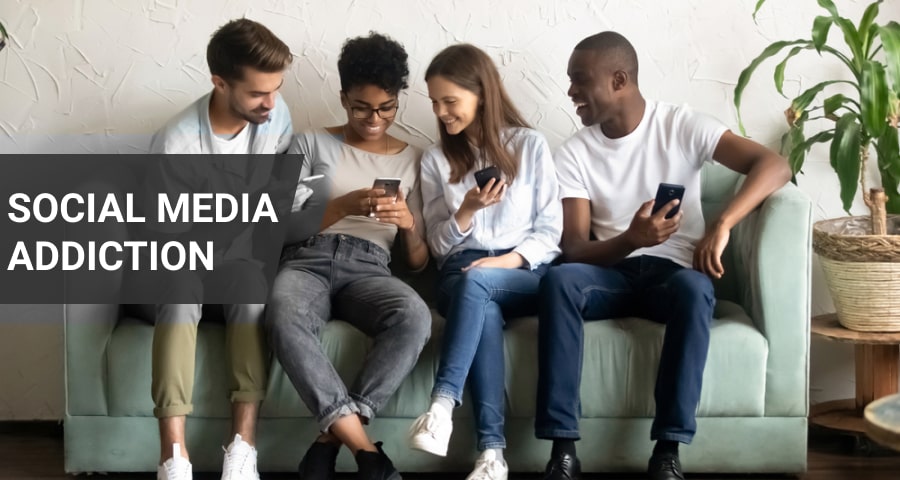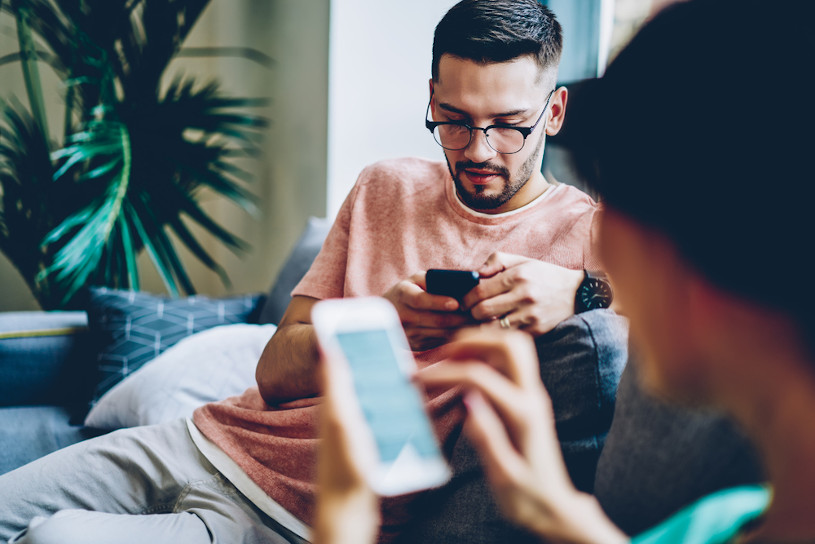
Social media emerged as a hub for social interaction, promoting relationships and allowing for self-expression and creativity.
As of December 2023, 91.56% of Americans are active on social media, with Facebook being the most popular platform. However, excessive use can lead to social media addiction (SMA). This condition skyrocketed during the COVID-19 pandemic due to the lockdowns, which pushed people to maintain strict online contact.
As this condition significantly disrupts several aspects of an individual’s life, keep reading to learn about its signs, causes and treatment.
Table Of Contents:
What is Addiction to Social Media?
Social media platforms like Instagram, LinkedIn, TikTok, and X are easily accessible third-party applications for smartphones and tablets. They enable photo and video sharing and allow users to interact with each other’s content.
While this is the positive side of social media, some users will experience the downside and develop an addiction. Social media addiction definition can be challenging to characterize. However, it has been described as a type of behavioral addiction that causes a strong emotional attachment to an internet-connected device and/or platform, with individuals feeling an intense need to stay online, significantly disrupting users’ functioning in essential life aspects.
Everyone is at risk of developing this addiction. However, since during adolescence, teenagers’ brains and social skills are still under development, they are particularly vulnerable to this addiction, with already 54% of American teens saying it would be difficult for them to give up social media.
Signs and Symptoms of Addiction to Social Media
While addiction to social media isn’t officially recognized by the Diagnostic and Statistical Manual of Mental Disorders (DSM-5), researchers agree it shares similarities with dependence on drugs such as alcohol, nicotine and heroin due to the set of feel-good experiences they provide to the user.
Based on this, clinicians may use the six elements of behavioral addictions to identify social media addiction, which are 1) salience, 2) tolerance, 3) mood modification, 4) relapse, 5) withdrawal and 6) conflict:
- Obsessing over social media at the expense of other life areas
- Increasing social media time for the same satisfaction level
- Using social media as a way to cope with or ease negative feelings
- Struggling to limit social media use despite efforts
- Failed attempts to cut back on social media
- Feeling distressed, anxious, or irritable without social media access
Causes of Social Media Addiction
Addiction to social media is predominantly driven by a multilayered interaction of mental health issues and environmental factors (i.e., the pressure to be constantly online). Depression and anxiety are two of the most common mental health issues associated with addiction to social media.
Anxiety and Addiction to Social Media
Individuals with anxiety may be prone to get addicted to social media due to a preference for online over face-to-face interactions, worsening fears of real-life socializing. This cycle can intensify as higher anxiety leads to increased reliance on social media for connection.
Depression and Social Media Addiction
As social media platforms are designed to trigger pleasure centers in the brain through likes, comments, and shares, those with depression may rely on social media to ease negative feelings. However, experiences like cyberbullying and social comparison can worsen the symptoms.
Fear of Missing Out (FOMO), Peer Influence and Accessibility
Social pressure from friends or peers may lead to compulsively checking and scrolling for social validation, as people fear missing important updates. Also, the widespread availability of smartphones and internet connectivity makes social media easily accessible, increasing the likelihood of excessive use
Social Media and Health Risks in Teenagers and Adults
Social media platforms, particularly TikTok and Instagram, have undeniably impacted teenagers’ and adults’ health and well-being. They have the potential to worsen existing health issues or give rise to new ones, such as:
Mental Health Effects
Studies have found a correlation between heavy social media use and increased rates of depression and anxiety among teenagers and adults. A study found that for every additional hour a teenager spends on social media, the depression risk goes up by 13%.
Cyberbullying
Social media platforms provide anonymity that can be used to intentionally harm others, leading to severe mental health consequences, including suicide. Reports indicate that 10% to 72% of youths have experienced cyberbullying globally.
Body Image and Self-Esteem
Instagram’s edited photos and filters distort beauty standards and create negative body image perceptions, especially among younger users.
Research shows a direct link between increased time spent on Instagram and higher dissatisfaction with body image, leading to notably lower self-esteem among users exceeding 3 hours of daily usage. This preoccupation with body image can escalate to eating disorders and body dysmorphia.
Physical Health
Social media overuse can cause a sedentary lifestyle, leading to health risks such as obesity and cardiovascular problems. Also, using social media before bed can disrupt sleep patterns, causing insomnia and poor sleep quality.
Social Media Addiction Treatment
Treatment for social media addiction encompasses various strategies aimed at addressing the underlying causes and helping individuals regain control of their online behaviors.
Key approaches include:
- Cognitive-Behavioral Therapy (CBT): Therapists use CBT to modify negative thought patterns and develop healthier coping mechanisms
- Mindfulness Techniques: Practices like meditation increase awareness of online habits and help in impulse management
- Setting Boundaries: Clear limits on social media use, like screen-free times or app restrictions, foster a healthier balance.
- Support Groups: Joining peers in support groups or counseling sessions offers community and encouragement
- Lifestyle Changes: Prioritizing offline activities reduces reliance on social media for pleasure
Social Media Addiction – Key Takeaways
Society is actively addressing the impact of digital devices on the community. The outcomes of Norway’s initiative to ban smartphones in middle schools present compelling evidence.
The intervention led to a nearly 60% decrease in girls’ visits to psychological specialists and a significant reduction of 46% in bullying incidents for girls and 43% for boys. Also, girls’ academic performance improved noticeably. These findings highlight the link between smartphone usage and mental health issues, calling for proactive measures.
Recognizing and addressing digital and social media dependency is paramount for societal well-being. If addiction to social media is suspected, seek professional help to build healthier online behaviors.
People Also Ask
Is social media addiction bad for mental health?
Yes, social media addiction can harm mental health by increasing anxiety, depression, and loneliness while decreasing self-esteem and sleep quality, often due to comparison, cyberbullying and excessive screen time.
Is gaming part of social media addiction?
No, but gaming can contribute to social media addiction through online multiplayer platforms and gaming communities. Excessive gaming can lead to similar negative impacts on mental health as other forms of social media addiction.
Is social media toxic and addictive?
Yes, social media can be toxic and addictive due to its constant stimulation, leading users to compare themselves with others, potential cyberbullying and reinforcement of addictive behaviors through likes and notifications.
Is there any social media addiction treatment center?
Yes, there are treatment centers and programs that specialize in addressing social media addiction and internet addiction more broadly. These centers offer various services, including individual and group therapy, counseling, education about healthy internet use, and techniques for managing online behavior.
Some treatment centers may incorporate mindfulness practices, cognitive-behavioral therapy (CBT), or other evidence-based approaches. Additionally, many mental health professionals and therapists offer specialized treatment for social media addiction in their private practices.

Hope Without Commitment
Find the best treatment options. Call our free and confidential helpline
Most private insurances accepted
Find Drug Rehabilitation Centers Near You Anywhere In the US
Addiction Resource team has compiled an extensive list of the top drug rehabilitation facilities around the country. Use our locator tool to find the best centers near you.
Page Sources
- Topic: Social media usage in the United States. (2023, December 18). Statista. https://www.statista.com/topics/3196/social-media-usage-in-the-united-states/
- Cheng, C., & Lau, C. (2022). Social Media Addiction during COVID-19-Mandated Physical Distancing: Relatedness Needs as Motives. International Journal of Environmental Research and Public Health, 19(8). https://doi.org/10.3390/ijerph19084621
- Cheng, C., Ebrahimi, O. V., & Luk, J. W. (2022). Heterogeneity of Prevalence of Social Media Addiction Across Multiple Classification Schemes: Latent Profile Analysis. Journal of Medical Internet Research, 24(1). https://doi.org/10.2196/27000
- Vally, Z., Helmy, M., & Fourie, L. (2023). The association between depression and addictive social media use during the COVID-19 pandemic: The mediating role of sense of control. PLOS ONE, 18(9). https://doi.org/10.1371/journal.pone.0291034
- Abrams, Z. (2023, August 3). Why young brains are especially vulnerable to social media. https://www.apa.org/news/apa/2022/social-media-children-teens
- B. (2024, April 14). Teens and social media: Key findings from Pew Research Center surveys. Pew Research Center. https://www.pewresearch.org/short-reads/2023/04/24/teens-and-social-media-key-findings-from-pew-research-center-surveys/
- Alavi, S. S., Ferdosi, M., Jannatifard, F., Eslami, M., Alaghemandan, H., & Setare, M. (2012). Behavioral Addiction versus Substance Addiction: Correspondence of Psychiatric and Psychological Views. International Journal of Preventive Medicine, 3(4), 290-294. https://www.ncbi.nlm.nih.gov/pmc/articles/PMC3354400/
- Luo, Q., Wu, N., & Huang, L. (2023). Cybervictimization and cyberbullying among college students: The chain mediating effects of stress and rumination. Frontiers in Psychology, 14. https://doi.org/10.3389/fpsyg.2023.1067165
- Alfonso-Fuertes, I., Alvarez-Mon, M. A., Ortega, M. A., Alvarez-Mon, M., & Molina-Ruiz, R. M. (2023). Time Spent on Instagram and Body Image, Self-esteem, and Physical Comparison Among Young Adults in Spain: Observational Study. JMIR Formative Research, 7. https://doi.org/10.2196/42207
- Zubair, U., Khan, M. K., & Albashari, M. (2023). Link between excessive social media use and psychiatric disorders. Annals of Medicine and Surgery, 85(4), 875-878. https://doi.org/10.1097/MS9.0000000000000112
- Liu, M., Kamper‐DeMarco, K. E., Zhang, J., Jia, X., Dong, D., & Xue, P. (2022). Time spent on social media and risk of depression in Adolescents: A Dose–Response Meta-Analysis. International Journal of Environmental Research and Public Health, 19(9), 5164. https://doi.org/10.3390/ijerph19095164
- Abrahamsson, S. (2024). Smartphone bans, student outcomes and mental health. Social Science Research Network. https://doi.org/10.2139/ssrn.4735240


 Reviewed by:
Reviewed by:  Written by:
Written by: 

 FindTreatment.gov
FindTreatment.gov